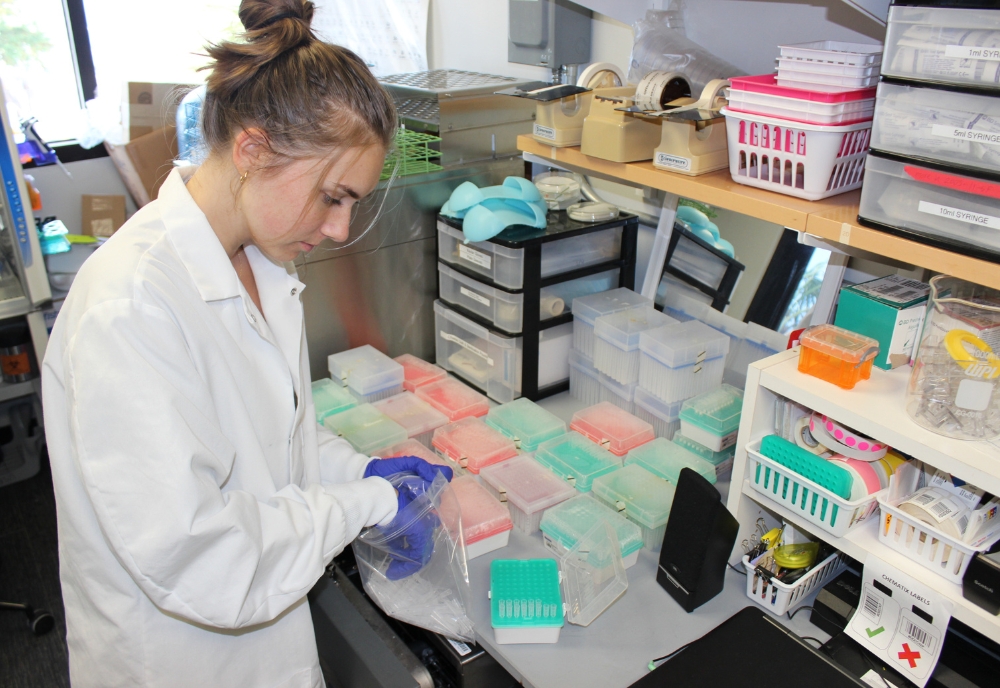The USF Sarasota-Manatee teaching lab’s two-year goal to earn My Green Lab Certification has come true.
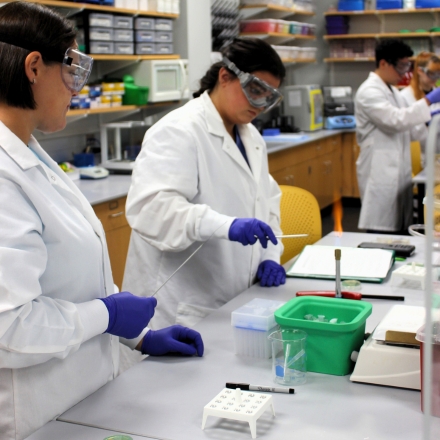
Genetics lab students (from left) Amanda Lovell and Lara Blair using metal inoculating loops instead of the single use plastic loops. (Photo courtesy of Victoria Ramirez)
The lab, located eight miles from the USF Sarasota-Manatee campus at the Mote Marine Research Lab and Aquarium, serves as a teaching lab for undergraduates who are earning a degree in majors requiring a lab component, such as biology, biomedical sciences, chemistry or cellular biology. According to laboratory manager Victoria Ramirez, about 250 students use the lab each week.
Earning a 93 percent assessment score places the lab in the highest level for certification — the “green level,” which is a designation given only to labs that meet 80 percent or more of overall sustainability processes assessed.
USF now joins a community of hundreds of labs that have been deemed My Green Lab certified.
“I am really proud of our accomplishment,” Ramirez said. “It recognizes our initiative to move toward a sustainable future and validates our efforts by achieving Green Status. I’m thankful for the hard work and dedication of my team and support of my supervisor Dr. Paul Kirchman to pursue this designation.”
Ramirez said earning this certification opens more doors to collaborate and network with an online community who share the same goals across multiple industries.
“We use this opportunity to educate our students and ask them for help. Since they are the next generation of policy makers and lab/business leaders they can use their experience at USF Sarasota-Manatee to be sustainability ambassadors,” she said.
The certification program run by My Green Lab, a non-profit dedicated to creating a culture of sustainability through science, is recognized by the United Nations “Race to Zero” campaign as a key measure of progress toward a zero-carbon future. My Green Lab Certification is considered the gold standard for laboratory sustainability best practices around the world.
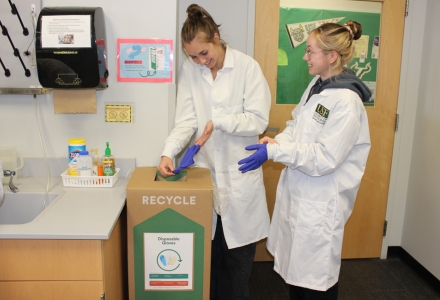
Abigail Pal, student worker, and Angelina Sacco, lab specialist, recycling their nitrile gloves after use. (Photo courtesy of Victoria Ramirez)
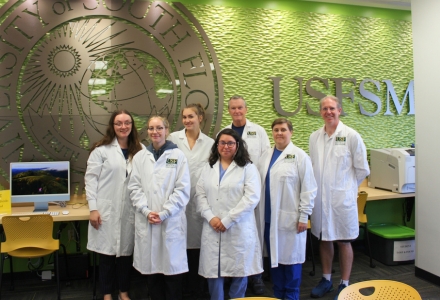
(From left) Dahlia Singer (student worker), Angelina Sacco (staff lab specialist), Abigail Pal (student worker), Scarleth Andino (student worker), Jim Fagan (adjunct professor and senior lab specialist), Karen Atwood (lab instructor), and Dr. Ryan McCleary (faculty instructor and lead biology faculty member of the Green Team). (Photo courtesy of Victoria Ramirez)
My Green Lab Certification aims to help organizations achieve their sustainability goals, offering “tried-and-true methods rooted in science to dramatically reduce the environmental impact of laboratories without disrupting the critical work underway.”
The globally recognized program for lab sustainability assesses and improves the environmental performance of laboratories by focusing on key areas like energy use, water consumption, waste management, chemical use and purchasing.
The certification process involves a comprehensive evaluation of a lab’s operations, followed by actionable recommendations to enhance sustainability.
To obtain certification, labs first complete a baseline assessment survey to identify current practices and areas for improvement. After making changes recommended by My Green Lab over several months, labs retake the survey, receive a certification level and get further guidance for continuous improvement. Labs must ensure sustainability becomes embedded into operations.
The journey toward My Green Lab certification started in 2022 when Ramirez began to gather all the pieces, get her team on board and officially start taking steps to acquire certification.
After completing initial assessments, the team received certification in August 2024, making history as the first time any USF lab has received this certification.
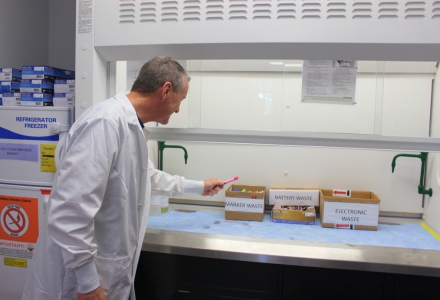
Senior Lab Specialist and Adjunct Professor Jim Fagan recycling a dry erase marker after his class. (Photo courtesy of Victoria Ramirez)
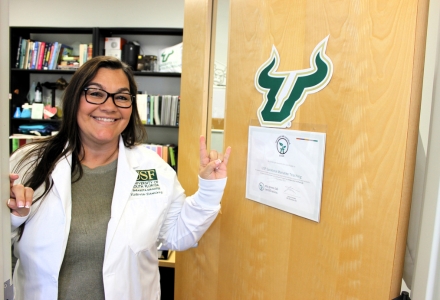
Teaching Lab Manager Victoria Ramirez proudly displays the new Green Lab Certification. (Photo courtesy of Victoria Ramirez)
Ramirez ensured steps were taken to implement and inform all lab users of their new sustainability practices, including sharing processes for recycling gloves, batteries, Swiffer dust cloths and dry erase markers.
“We also streamlined our ordering system to minimize environmental impacts from shipping, using ACT labels to determine the most sustainable options for items, placing aerators on faucets, repurposing office/lab supplies, unplugging equipment when not in use and cutting down on single-use plastics in the labs such as inoculating loops and cell spreaders,” Ramirez added.
The lab’s My Green Lab Certification is valid for two years, after which they must recertify.
“Students who graduate will continue these habits and create a culture of sustainability in their research labs — maybe even becoming a principal investigator one day. There is a global movement by some large funding bodies requiring sustainability certifications on grant applications. While this isn’t happening in the United States, yet, it has started to be a requirement for research in Europe,” Ramirez said. “It is my hope that our certification will serve as a model that can be used to implement these changes to teaching labs on our larger campuses.”
